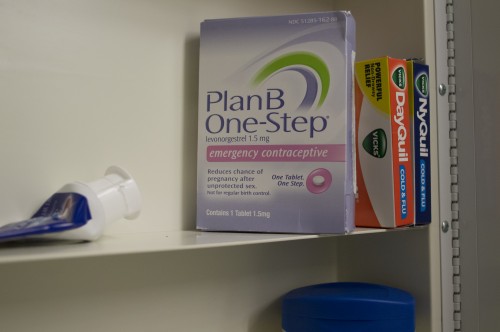A Maryland House of Delegates committee heard testimony Tuesday on a bill to provide 24/7 access to emergency contraceptives on college campuses in the state.
The bill, sponsored by Del. Maricé Morales, D-Montgomery, would require student health centers in the state to offer emergency contraceptives on-site. Colleges and universities would also need to ensure access to over-the-counter contraceptives — commonly known as the “morning after pill” — at all times.
Students from Bowie State and Salisbury University and representatives from NARAL Pro-Choice Maryland, Planned Parenthood of Maryland and the American Civil Liberties Union of Maryland testified in support of the bill. The University of Maryland’s Student Government Association passed a resolution in support of the bill on March 8.
[Read more: A Montgomery County lawmaker’s bill calls for 24/7 access to Plan B on college campuses]
Students from this university’s Terps Indivisible and American Association of University Women planned to attend the hearing, but did not because of Tuesday’s snow.
No one testified in opposition at Tuesday’s hearing.
Emergency contraceptives are not readily available to many college students in the state, said Diana Philip, NARAL Pro-Choice Maryland executive director. Cost, limited health center hours and transportation issues may hinder students’ ability to access emergency contraceptives off the campus in a timely manner, Philip said.
Morales said the purpose of her bill is to provide access to emergency contraceptives at all times, but this would not require student health centers to remain open 24/7, which some school officials in the state feared would be too costly.
Instead, universities could install on-campus vending machines that would dispense over-the-counter contraceptives like Plan B, Philip said. The cost of a vending machine would be less than $3,800, according to the bill’s legislative fiscal note.
The machines could also provide other products — such as aspirin, tampons and condoms — to protect the privacy of students using them, she added.
“The intent behind this bill was not for 24/7 student health centers to be open,” Philip said. “The intent was to find and allow these campuses to work with students to figure out what is the best way for them to offer this care.”
[Read more: UMD SGA votes to support 24/7 “morning after pill” access, as long as costs are reasonable]
President Trump’s election and Republican control of Congress have raised concerns about the future of contraception coverage in the United States. Trump and Republican lawmakers have repeatedly called to repeal the Affordable Care Act, which requires insurers to cover FDA-approved forms of contraception. On March 6, Republicans introduced a bill to replace the Affordable Care Act that keeps birth control coverage intact, but strips federal funding from Planned Parenthood, which provides abortion services, contraceptives cancer screenings and women’s health counseling.
The Maryland Contraceptive Equity Act, which takes effect on Jan. 1, will require insurers in the state to cover most forms of birth control — including emergency contraceptives — with no out-of-pocket costs.
Plan B usually costs $40 to $50 at off-campus pharmacies, while student health centers often offer generic versions of emergency contraceptives at a much lower price, Philip said. This university’s Health Center pharmacy is open during business hours Monday through Friday, and provides a generic version of Plan B for $15. Ella, a more effective emergency contraception method, is also available to students who visit the health center.
Robyn Elliott, a lobbyist who spoke on behalf of Planned Parenthood of Maryland, said it is important to make emergency contraceptives available to students who may not be able to easily travel off the campus.
“We really want contraception to be available where the person is and where they need it,” Elliott said. “In the instance of emergency contraception, hours really do count as to the effectiveness.”
Del. Sid Saab, R-Anne Arundel, asked the panel why students couldn’t go to a 24-hour pharmacy for emergency contraceptives. Philip replied that while there may be a drug store off the campus, this could require using a car and paying up to $50. Women should take emergency contraceptives within 12 hours of unprotected sex for the pill to be most effective, which could be a challenge for some students, particularly on rural campuses, Philip added.
Bowie State University does not offer emergency contraception on-site and refers students to local pharmacies.
“It’s pretty tough to get access to emergency contraception since it’s off campus,” said Charnelle Ferguson, a Bowie State student.
“And most freshmen aren’t allowed to have cars on campus.”
Students may receive inaccurate information when they are forced to travel off the campus for emergency contraception, said Annaliese Johnson, an organizer with NARAL Pro-Choice Maryland. Some off-campus health care centers assert there is a link between emergency contraception and abortion, which is not scientifically accurate, to discourage contraception use, she said.
Vending machines could help address the problem of misinformation by prominently displaying how the product works and what potential side effects could occur, Johnson added.
“We have to make an effort as a community and as a state to ensure [students] have access to the reproductive and sexual health care that they need, 24/7,” she said.
Because some public higher education institutions in the state, including some community colleges, do not have a student health center, Philip said the bill’s supporters would be willing to add an amendment to clarify these requirements apply to only the institutions that provide housing to students.
The committee will next give the bill a favorable or unfavorable report before it will move to the full house for a preliminary vote.



